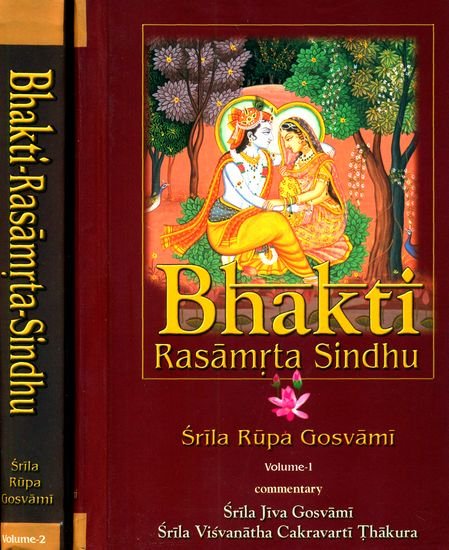Bhakti-rasamrta-sindhu
by Śrīla Rūpa Gosvāmī | 180,912 words
The English translation of the Sri Bhakti-rasamrta-sindhu verse 2.1.202; a medieval era Sanskrit book, written by Rupa Goswami (fl. 15th century) which represents a devotional (bhakti) masterpiece. In this work Goswami describes the nature and different forms of pure love (rasa) as well as various other topics on Vaishnavism and devotion.
Verse 2.1.202
Sanskrit text, Unicode transliteration and English translation:
यथा वा —
तत्त्वैर् ब्रह्माण्डम् आढ्यं सुरकुल-भुवनैश् चाङ्कितं योजनानां
पञ्चाशत्-कोट्य्-अखर्व-क्षिति-खचितम् इदं यच् च पाताल-पूर्णम् ।
तादृग्-ब्रह्माण्ड-लक्षायुत-परिचय-भाग् एक-कक्षं विधात्रा
दृष्टं यस्यात्र वृन्दावनम् अपि भवतः कः स्तुतौ तस्य शक्तः ॥२.१.२०१॥yathā vā —
tattvair brahmāṇḍam āḍhyaṃ surakula-bhuvanaiś cāṅkitaṃ yojanānāṃ
pañcāśat-koṭy-akharva-kṣiti-khacitam idaṃ yac ca pātāla-pūrṇam |
tādṛg-brahmāṇḍa-lakṣāyuta-paricaya-bhāg eka-kakṣaṃ vidhātrā
dṛṣṭaṃ yasyātra vṛndāvanam api bhavataḥ kaḥ stutau tasya śaktaḥ ||2.1.201||
English translation
Sanskrit text, Unicode transliteration and English translation:
अनोथेर् एxअम्प्ले:
“होw इस् इत् पोस्सिब्ले तो ग्लोरिfय् योउ, wहो ब्रह्मा सw इन् वृन्दावन? इन् ओने चोर्नेर् ओf थत् वृन्दावन अरे सितुअतेद् अरे सितुअतेद् अ मिल्लिओन् उनिवेर्सेस्, एअछ् मदे ओf अन् एअर्थ् मेअसुरिन्ग् ५००,०००,००० योजनस् इन् दिअमेतेर्, एअछ् fइल्लेद् wइथ् लोwएर् हेल्लिस्ह् प्लनेत्स् अन्द् थे उप्पेर् हेअवेन्ल्य् प्लनेत्स् अन्द् अल्ल् थे मतेरिअल् एलेमेन्त्स्.”
(५८) अवतारावली-बीजम् —
अवतारावली-बीजम् अवतारी निगद्यते ॥२.१.२०२॥Another example:
“How is it possible to glorify You, who Brahmā saw in Vṛndāvana? In one corner of that Vṛndāvana are situated are situated a million universes, each made of an earth measuring 500,000,000 yojanas in diameter, each filled with lower hellish planets and the upper heavenly planets and all the material elements.”(58) avatārāvalī-bījam —
avatārāvalī-bījam avatārī nigadyate ||2.1.202||
English translation
(58) avatārāvalī-bījam: the seed of all avatāras —
“He who is the source of all the avatāras is called the seed of all avatāras.”
